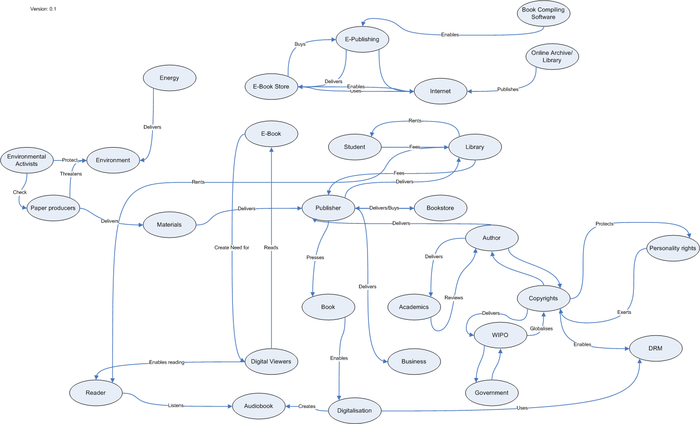Difference between revisions of "The future of e-books in 2017"
| Line 13: | Line 13: | ||
Future of the Book questions: | Future of the Book questions: | ||
''(All the answers can be read in the [[Client question analysis section]])'' | |||
* as the materials that are now published in books are learned through computer screens, what about the form will stay the same and what will change? authorship, editing, presentation style, stored locally? | * as the materials that are now published in books are learned through computer screens, what about the form will stay the same and what will change? authorship, editing, presentation style, stored locally?<br /> | ||
closely related question: | closely related question: | ||
Revision as of 17:33, 20 March 2007
Introduction
When writing systems were invented in ancient civilizations, nearly everything that could be written upon—stone, clay, tree bark, metal sheets—was used for writing. In China,silk was also a base for writing and writing was done with brushes. Many other materials were used as bases: bone, bronze, pottery, shell, etc.Any material which will hold and transmit text is a candidate for books.
Nowadays information technology and the Internet offer total new ways of publishing. For years, newspapers and magazines have been published online, and on 90s also traditional printed books reached digital form. Electronic books or e-books, can now be bought and downloaded from online e-bookstores and be read on computer screen or portable e-book device.
Client Questions
Future of the Book questions:
(All the answers can be read in the Client question analysis section)
- as the materials that are now published in books are learned through computer screens, what about the form will stay the same and what will change? authorship, editing, presentation style, stored locally?
closely related question:
- will there be parallel publishing of a book on screen and print, and if so, will they be mostly similar or will it be a largely different production (such as a novel and movie).
- what will be the role, if any, of scanned books in the future ecology? sales tool? reference work for searching? only old books will be used this way? old books wont be used even on screens by the general public?
different question:
- certain types of books are large part gone already: books of court opinions, phonebooks, readers guide to periodical literature... Given the types of books that are out there, what will they morph or disappear into a computer service?
-brewster kahle
Team Composition
Research Questions
In our research we have identified 5 different categories, namely:
- History (Xin Yu)
- Economic Perspective/Value (Raymond)
- General Information (Raymond/Sanna)
- Prospective usage of books (Bas)
- Law, Legislation and Stakeholders (Bauke)
See the research questions section for the actual questions and answers.
Driving Forces
Based on the PEST theory
Political
- Authors rights and personality rights changes
- Members of WIPO leave
- The future of publishing and supply chain change
- Government control of publishing
Economic
- Authors of books will be creating books under "open source like" licences
- eBooks and the effect on knowledge sharing in developing countries
- Importance of learning increases over protection
- Emergence of E-publishing
- Emergence of Library 2.0
Environmental
Social
- Literacy rates increase worldwide
- Escalation of plagiarism accusation
- Is there a future for the library
- Perception of reading habit
Technological
- Development of e-book readers
- New features compared to printed books
- New development in (free)energy http://www.steorn.org
- Unified standard for e-books
- Books (paper) are preferred over digital media
- Copyrights of digitized books become untrackable
- Screen technology
- Conversion of books to eBooks
Diagrams
Systems Diagram
Other diagrams
Scenarios
Scenario 1
Scenario 2
Scenario 3
References
- Wikipedia's definition of a book
- Merriam-Webster's definition of a book
- Information about Larry Lessig a proponent of reduced legal restrictions on copyright, trademark, and particularly in technology applications
- Official Larry Lessig page
- More information about the library of Alexandria which lasted for over 500 years
- Website that supports scholarly research on internet law, especially copyright and trademark issues
- Notes on thoughts and visions from Brewster Kahle
- Interesting findings about eBooks and Microsoft copy protections
- International Digital Publishing Forum, supported by more than 40 stakeholders
- EBSCO
- E-Ink, potential e-book technology accelerator
- list of ebook sites
- Share, reuse, and remix — legally, an approach for copyright and sharing
Known Projects and sites: (non-exaustive list)
- Million Book Project
- Project Gutenberg
- International Childrens's Digital Library
- Distributed Libary Project
- The Oxford Text Archive
- O'Reilly Safari Books Online
- Knovel
- Diesel eBooks
- Google Book (Print) project
- Amazon's Search Inside the Book
- American Memory from the Library of Congress
- New Digital Library project by US National Congress
